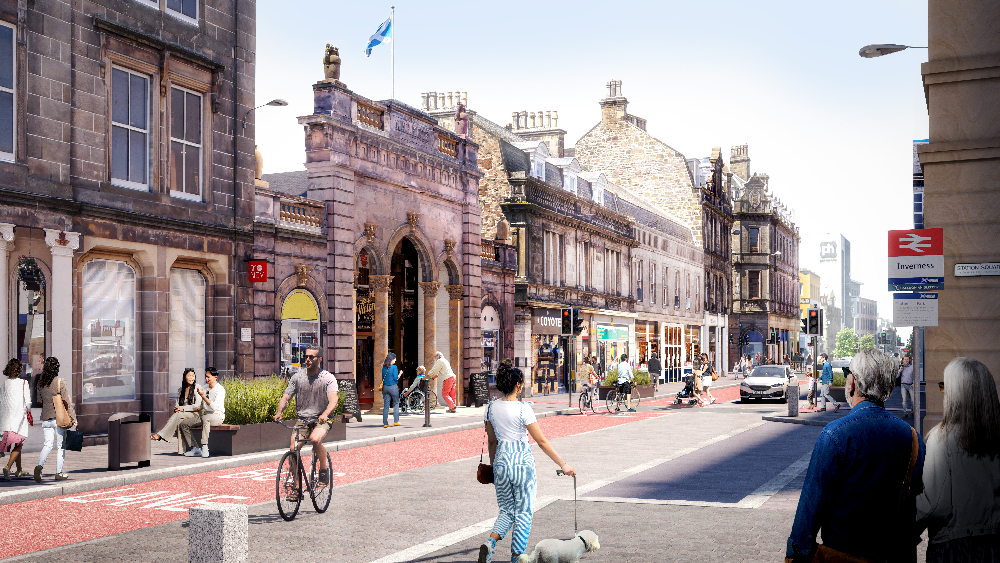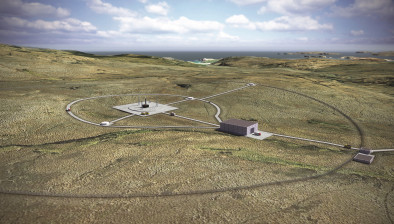Inverness street redesign consultation deemed unlawful

The Highland Council’s decision to redesign part of Inverness city centre has been overturned by a senior judge after the plans were challenged by the owners of the region’s biggest shopping centre.
The local authority had approved detailed designs for the redevelopment of Academy Street which sought to strike a balance between delivering sustainable transport, city centre regeneration, and supporting the city centre economy.
Among the project’s key features were the widening of pavements to make it more attractive for pedestrians as well as hospitality businesses and facilitate a reduction of vehicles in favour of trees and planting.
But in a legal challenge brought to the Court of Session, trustees of the owners of Eastgate Shopping Centre argued that a proper consultation was not held on the plans and the impact on businesses had not been considered.
The local authority, which had previously unsuccessfully attempted to have the petition dismissed on the grounds of incompetence and prematurity, maintained the decisions had been taken lawfully.
However, Lord Sandison has now agreed that the council had failed to give proper consideration to all the proposed options.
Fundamentally different
On 28 August 2023, the council’s City of Inverness Area Committee resolved that officers should proceed to finalise a proposed design for Academy Street and consult on a relative Traffic Restriction Order. A previous variant of the proposal had been put forward in a report to committee in November 2022, with the Area Committee resolving then that officers should proceed with development of that design.
Previously, a non-statutory consultation exercise had been conducted in May 2022 on a proposal which did not indicate that there was any intention to severely restrict access to Academy Street for private vehicles. Senior counsel for the Trustees of the Eastgate Unit Trust submitted that the decision to exclude this option from further consideration, before any traffic or economic impact assessments had been carried out, had prevented the public from participating in a meaningful consultation or making sensible representations.
It was further submitted that the current proposal was fundamentally different from the original proposal, in that it sought to restrict vehicular access while the original proposal did not. It should therefore have been presented as an alternative to the first proposal, not as a refinement, and thus the original proposal had been unlawfully excluded from consultation.
On behalf of the council, it was submitted that it was not necessary to maintain Option A (the May proposal) in order to get a meaningful response to consultation on Option B (the November proposal). Option A had been created as part of a pre-TRO “optioneering” process intended to be an iterative exercise where an initial proposal would be changed or replaced in light of ongoing public responses. This was because it was not possible to run the TRO process with more than one proposal at a time, necessitating a single proposal being consulted upon.
Legitimate sense of injustice
In his decision, Lord Sandison said of the fairness of the consultation process: “On an objective analysis of the events of the consultation exercise in the present case, the following observations may be made. During the initial stage of the exercise, until November 2022, when Option A was being canvassed, there was no indication from the respondent that any active consideration was being given to the possibility of Academy Street being closed to through private traffic. Those participating in the consultation were accordingly not invited or encouraged to comment on such a possibility.”
He continued: “The difficulty came in August and September 2023 when the respondent, faced by its officers with a stark choice between the developed Option B and reverting to the pre-Covid situation, chose to move forward with the former as the sole proposed scheme to be taken through the TRO process and into possible implementation without affording any further opportunity for consultation on the respective merits and disadvantages of Options A and B, or indeed on those of reverting to the pre-Covid situation.”
Testing the process as a whole against indicators of unfairness, Lord Sandison said: “It may be seen that, at the very least, the sequence of events which transpired in the course of the consultation exercise failed to assist the respondent not only to choose whether or not to take any action, but to select which course of action it might most advantageously take; it was productive of a legitimate sense of injustice on the part of the petitioners and, it may be, others in a similar position to them; and insofar as reliance is placed on the TRO consultation exercise yet to come, is not taking place at a point where proposals are in any meaningful way at a formative stage.”
He concluded: “While I entirely absolve the respondent and its officers of any subjective intention to run a substantively unfair consultation exercise, recognising that it may only be with the benefit of hindsight that one can see where and how matters went awry, objectively viewed their actions were calculated to, and did, produce a consultation which was unfair to and beyond the point of unlawfulness.”
On this ground, Lord Sandison therefore reduced the decisions complained of.
Highland Council said it was disappointed by the decision and hoped to provide an update on the redesign this week.
Inverness city leader Ian Brown said: “Due to the length of Lord Sandison’s judgement the council will require time to consider the decision in detail before we are able to comment further on this matter.
“It is anticipated that an update of the council’s position in relation to Academy Street will be provided (this) week following a comprehensive review of the judgement and the options available to the council.”























